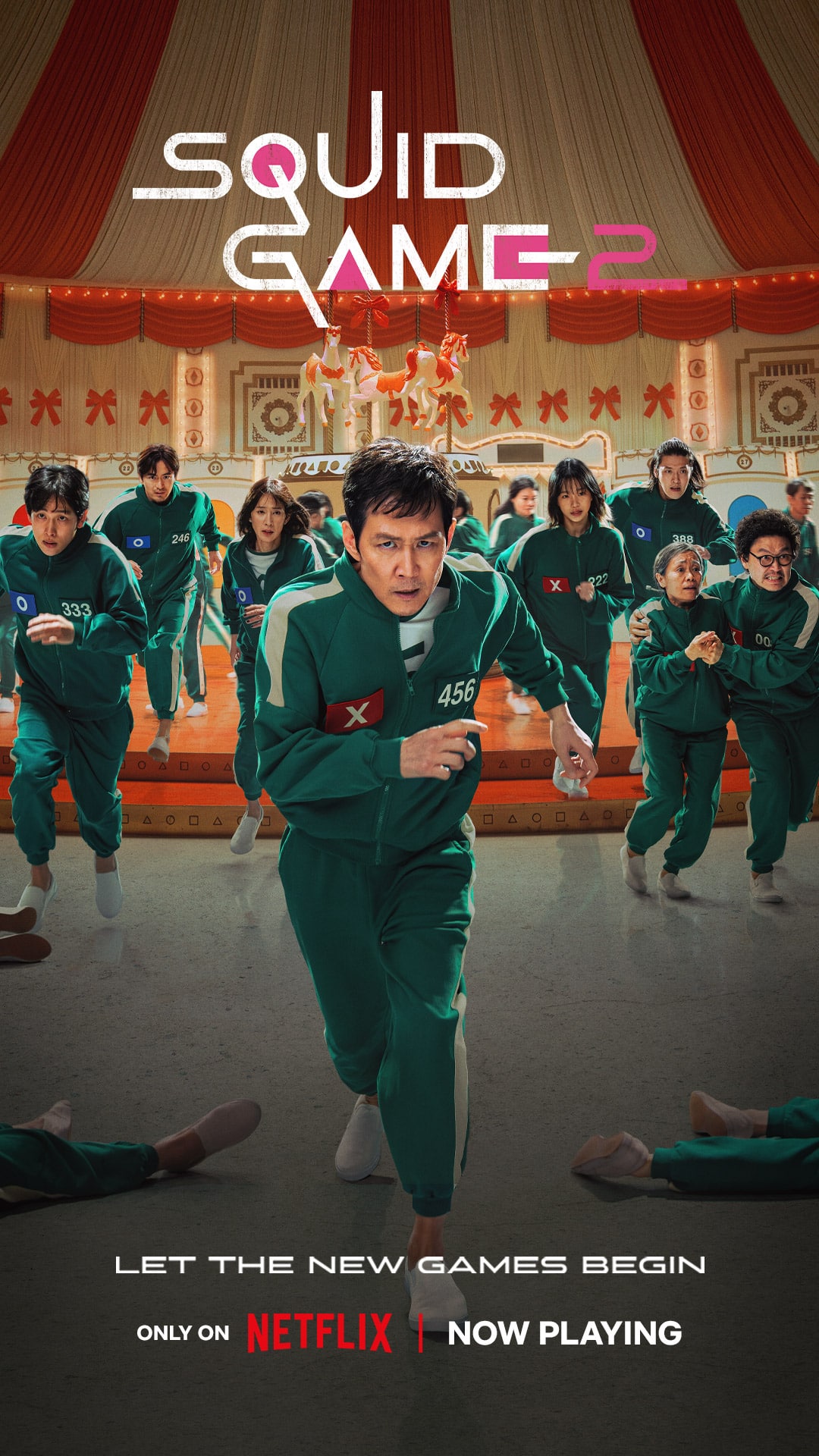
- Creator
- Hwang Dong-hyuk
- Rating
- TV-MA
- Episodes
- 7
- Running Time
- 427 minutes
- Channel
- Netflix
Overall Score
Rating Summary
After the massive success of the first season of Squid Game back in 2021, the series returns with a new season that dives even deeper into the its themes of class struggle and human desperation. The most-watched series in the history of Netflix, so to say that expectations were high for Season 2 would be a massive understatement.
Fortunately, this new season mostly delivers as it sees creator Hwang Dong-hyuk build upon on the foundation he laid out in the first season, presenting new games, new friends and foes, and new challenges for Gi-hun (Lee Jung-jae). As he is now focused on ending the games rather than on his own survival, the games are presented from a new perspective. It’s this perspective, the new season showcases new aspects of the underdog, as well as the manner in which oppressive regimes can quash rebellion.
New to this season is a voting system where players decide whether the games end or continue. Squid Game is not known for being subtle with its political themes, and season 2 is no exception. When Player 001’s vote becomes the deciding factor in a tie, he asks Gi-hun, “Let’s say I pressed X and we all left. Would everyone have been happy?” The democratic system listens to the majority, but the majority are essentially voting to kill people in the hopes they will acquire a larger cash prize.
Player 001, a.k.a. the Front Man (Lee Byung-hun), is a compelling villain who brings a welcome moral complexity to the season. While the Front Man can sabotage Gi-hun’s plans without joining the game, he joins to validate his cynical view of humanity in the hopes of getting Gi-hun to see the error in his ways. The games themselves are philosophical as much as they are physical, as the Front Man uses them to test humanity’s propensity for both selflessness and selfishness. Gi-hun puts his life on the line to save others, but he can’t save anyone if half the players vote for the game to continue. The Front Man’s organization claims the voting system serves the players when it robs players of their autonomy. Rather than respecting the wishes of those who want to leave and allowing willing participants to compete amongst themselves, the Masked Men impose a system that leaves players at the mercy of others.
The season also examines the worldview of the Salesman (Gong Yoo), who, while presenting himself as a benevolent man that offers bread to the homeless, is a man who refers to the people he meets as “trash.” He is a condescending, sadistic, psychopathic character, but the combination of Yoo’s incredible performance and Dong-hyuk’s writing create a villain who is both captivating and deeply unsettling. Gi-hun and the Salesman’s back-and-forth as they play Russian Roulette is Squid Game at its best, uncovering the darkness of human nature while the players participate in a game of life and death. Despite his early demise, his impact remains long after to the point that it becomes nearly impossible to stop watching afterwards.
The Salesman’s death leads to Gi-hun re-entering the game, where he meets new players, including the purple-haired Thanos (Choi Seung-hyun), the pregnant Jun-hee (Jo Yuri), mother and son duo Geum-ja (Kang Ae-sim) and Yong-sik (Yang Dong-geun), and Gi-hun’s old friend Jung-bae (Lee Seo-hwan). Some of these characters take on similar roles to that of the first season, with Thanos replacing Deok-su as the new bully. However, this season is fully aware that the new characters are different people, so it cleverly avoids treading the same ground. Yong-sik struggles with getting his gambling problem under control while keeping his mother safe. Jun-hee competes for prize money to raise her child after her boyfriend pushed her into a crypto scam and abandoned her. Jung-bae hopes to recover from significant financial debt. The new characters all enrich the world of Squid Game and feel like real people with real problems – problems that extend far beyond their financial woes.
It would have been easy for Squid Game to do a disservice to the new cast and fall into the trap of creating “2.0” versions of Ali, Sae-byeok, and Sang-woo. That being said, this new season not only avoids that, but refrains from becoming a “Greatest Hits” collection or an attempt to outdo the first season. The creative direction is showcased in this season’s new games, with Mingle and the Six-Legged Pentathlon bringing out new team dynamics that were not present in Season 1. Red Light, Green Light returns, but it becomes a game of Gi-hun trying to save as many lives as possible.
On the downside, this season suffers from a lack of focus compared to its predecessor. While the first benefits from maintaining a tight focus on the games, this sophomore season tackles the development of new characters, the exploration of the Front Man’s motivations, Detective Jun-ho’s (Wi Ha-joon) search for the island, and setting the stage for Gi-hun’s rebellion. This season spends more time than necessary on Jun-ho’s team as they search for the island where the Squid Games are held. They make little progress in finding the island, and aside from the reveal of their captain as a double agent, their most relevant scene in the plot is the team discovering that Gi-hun’s tracking device has been removed. By the end of the season, Jun-ho’s team have failed to locate the island or recognize that there is a double agent in their ranks. At the same time, Gi-hun’s rebellion against the Front Man’s organization ends in catastrophic failure. Gi-hun witnesses the Front Man kill his best friend, reacts in horror, and the screen fades to black.
While it’s understandable that not everything gets resolved in Season 2, the frustration lies in the fact that nothing is resolved. The season ends in a way that feels less like a cliffhanger and more like several episodes are missing, especially since it is two episodes shorter than the first season. From a business standpoint, the sudden ending will likely benefit Netflix by getting viewers to watch the next season. From a narrative standpoint, it feels like an abrupt and particularly unsatisfying cliffhanger. The ending of the season feels incomplete as a result, leaving too much unresolved.
At the end of the day, despite the lack of resolution, Squid Game Season 2 succeeds in expanding its exploration of capitalism and class struggle. The new characters are welcome additions to the show, though Season 2 loses some of Squid Game’s effectiveness due to its focus being split across multiple storylines with the added challenge of setting up the series’ third and final season. Suffice it to say that the stakes have never been higher, setting that stage for what promises to be an incredible final season.
still courtesy of Netflix
If you liked this, please read our other reviews here and don’t forget to follow us on Twitter or Instagram or like us on Facebook.

Discover more from
Subscribe to get the latest posts sent to your email.
